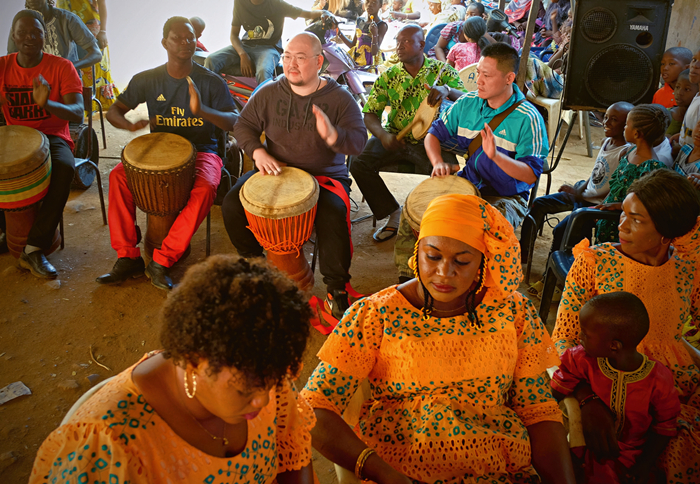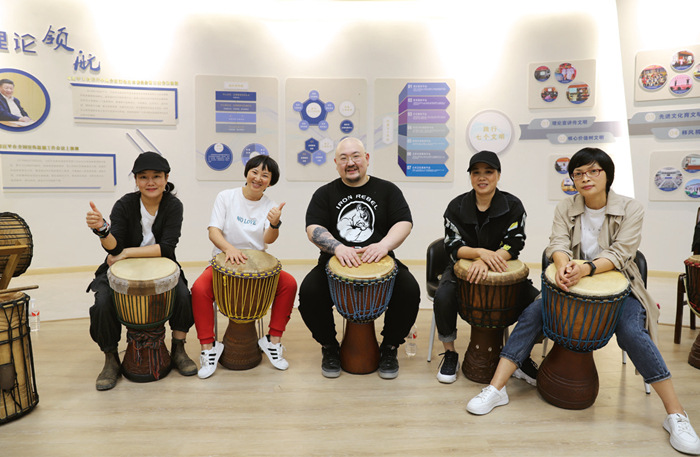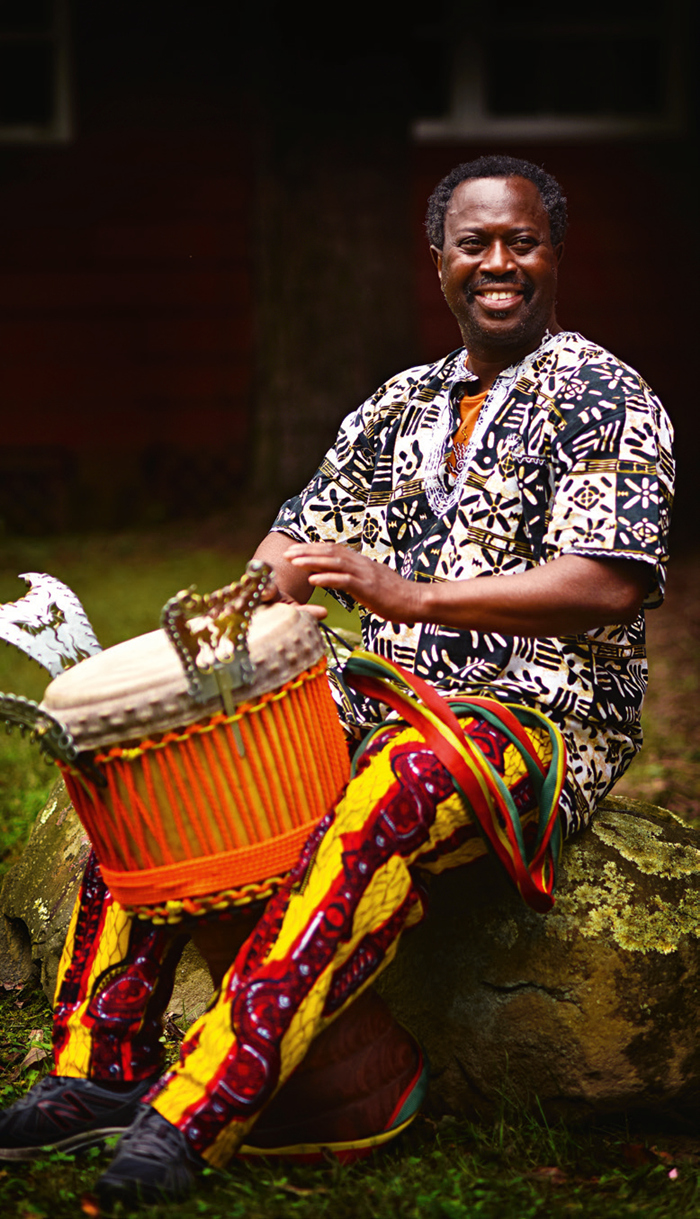|
||||||||||
| Home Nation World Business Opinion Lifestyle ChinAfrica Multimedia Columnists Documents Special Reports |
|
||||||||||
| Home Nation World Business Opinion Lifestyle ChinAfrica Multimedia Columnists Documents Special Reports |
| People-to-people contacts |
| Rhythms for Life |
| A Chinese percussionist’s journey to find the roots of the African djembe |
| By Li Xiaoyu 丨VOL. 14 MARCH 2022 ·2022-03-15 |

Tian Yang (second right, second row), while in Mali, late 2019 (COURTESY)
The djembe is a percussion instrument that is synonymous with traditional West African music. Despite the fact that it is now well-known in Europe, the U.S., and Japan as a result of the outstanding djembefola (djembe players in Mandingue) who have established study centers there, relatively few Chinese music enthusiasts are familiar with its traits. Tian Yang, 36, is a rare exception. More than 10 years after his initial encounter with the instrument, he is still expanding not just his musical expertise, but also his understanding of the Manding culture, which is accredited with the invention of the djembe.
Tian has been a music fan since he was young. He has acquired a strong sense of rhythm over the years, as evidenced by the hundreds of CDs he has amassed, which are displayed on the wall of his studio. But it was in 2007 that he first heard the heady and captivating sounds of the djembe on the sidelines of a rock concert in Beijing. Fascinated by the aesthetics of the instrument, its wide range of sounds and its rich timbre, the young musician devoted himself to it wholeheartedly.
He conducted considerable study and watched every video he could find on the Internet to immerse himself in the performances of foreign percussionists. He discovered that the djembe accompaniment is typically consistent in all types of performances, but the improvisations have big variations, with performers using conventional styles as a foundation for their improvisations.
“The improvisations are the essence of percussion. This is where I discover my mark and where I can let my emotions run wild. It is an endless source of inspiration,” Tian told ChinAfrica.
Guinean style, Malian touch
The djembe’s history can be traced back to the 13th-century Mandingo Empire, which spanned from regions in today’s Mali to Guinea, encompassing Cote d’Ivoire, Senegal and Burkina Faso. Almost all of the leading djembefolas at present come from Guinea and Mali. Tian, like other amateurs, was introduced to the Guinean djembe, which is recognized around the world because of the famed National Ballets of Guinea. Under the supervision of former Guinean President Ahmed Sékou Touré, the Ballets became the national ensemble of Guinea in 1960.
Tian was impressed by the skills of internationally recognized Guinean performers such as Mamady Keïta, Famoudou Konaté and Bolokada Conde, whom he met when they were on tour of China. “I was always perplexed as to why this instrument, which I used on a regular basis, could sound so different when played by the masters,” Tian said. He knows their repertoire like the back of his hand, and enjoys navigating through tunes like Balakulandjan, Djole, Baga Gine, and Sofa.
As his skills improved, the Chinese drummer began to include Malian elements, which he believes better represent the djembe’s native setting, in his performance. “Whereas the Guinean style appears to be a large, straight avenue, the Malian style appears to be a winding route with magnificent scenery,” Tian said. This approach corresponds to his search for the roots of the djembe, and he finally integrated the features of the two styles, 10 years after his first encounter with the instrument.

Tian Yang (center) with members of his club in Beijing (COURTESY)
A beautiful adventure
Tian spent 20 days in Mali’s capital Bamako in 2019 at the invitation of Moussa Traoré, a local djembe master whom he first met in China the previous year. Bamako, with a population of over 2.5 million people, features various ethnic cultures, notably that of the Mandingos. Many families would attend baptism, circumcision, engagement or wedding ceremonies at weekend. The djembe is a must-have for each of these gatherings. The performing improvisation phrases serve as a guide for the steps of dancers.
Instead of giving his Chinese student solo instruction, Traoré led him to experience the everyday lives of Malian drummers, visiting and participating in ceremonial rites. The most significant lesson, according to the mentor, can only be learned by immersing oneself in the core of djembe culture. The approach appears to have worked: The memory of the encounters is still fresh in Tian’s mind.
The rhythm of the djembe provides a profound human experience. Paintings by Malian artists adorn the walls of Tian’s studio, as do so many other symbols of his love for the nation, its people, and its culture. Thanks to this fabulous journey to the roots of the djembe, percussion and African sounds, Tian understands that each music piece has a specific meaning, a language of its own. This is the reason why some pieces are only played on special occasions. That’s the full extent of the art of the djembe that he was able to apprehend by being on the ground.
More than a passion
Tian is so passionate about percussion that he decided to pursue it as a career. He started the first djembe club in Beijing in 2009, which remains in business today, in order to create a community for all the amateurs.
That was the intended goal. But with just roughly 30 students, the group has not developed to the size he had envisioned more than 10 years ago. When they faced increasing challenges after a certain period of training, most trainees became discouraged, which Tian regrets. “The only way to become a player worthy of the name is to practice! Of course, finding such settings to practice outside of Africa is tough, but progress can be made by listening and imitating. It’s exactly the same principle as learning a foreign language,” he said.
While he has temporarily put aside his ambitions on the club, he still wants to improve his skills. He intends to return to Mali as soon as the pandemic-related movement restrictions are relaxed. “When playing the djembe, I will continue to step out of my comfort zone, raise the bar of my ambitions, and grasp and internalize the African mentality,” he said.

Moussa Traoré (COURTESY)
King of the Malian djembe
Moussa Traoré was born and raised in Mali, where he has been a djembe player for over 30 years. He is a talented musician, performing for the theater, at traditional events, and in the Malian pop circle. He is regarded as one of the country’s greatest djembe players. He distinguished himself after going to the U.S. to pass on his expertise and maintain his career as an artist. He is presently a professor at Brown University in Rhode Island, where he also conducts weekly community seminars. In 2016, with the assistance of his students, he established Malifoli International Djembe Academy, making outstanding contributions to the promotion of Mali’s music culture. In addition, he hosts yearly seminars in Mali for enthusiasts from all over the world. In his career, he has published three djembe albums: Mali Kan, Mali Foli, and Dakan.
|
||||||||||||
| About Us | Contact Us | Advertise with Us | Subscribe |
| Copyright Beijing Review All rights reserved 京ICP备08005356号-5 京公网安备110102005860号 |